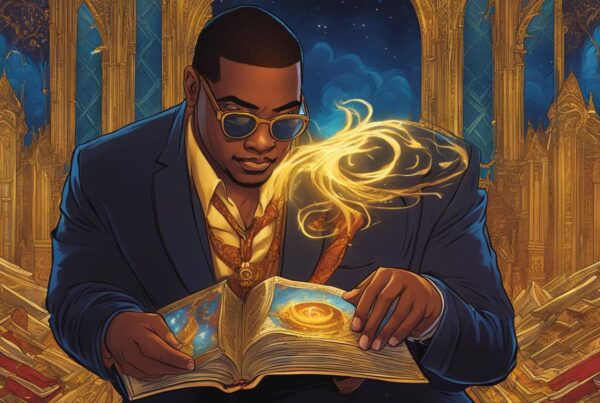If you’re looking for a book that will inspire and motivate you, then “Touch the Top of the World” by Erik Weihenmayer is a must-read. This gripping autobiography tells the incredible story of a man who overcame physical and emotional challenges to become a remarkable mountaineer, summiting the world’s highest peak, Mount Everest, despite being blind.
In this book, Weihenmayer recounts the journey that led him to achieve his lifelong dream of climbing Mount Everest, sharing his experiences of adversity, triumph, and personal growth along the way. The book takes readers on a gripping journey of self-discovery, resilience, and achievement, leaving them feeling inspired and motivated to pursue their own dreams.
Key Takeaways
- Despite facing numerous challenges, it’s possible to achieve your dreams if you remain determined and resilient.
- Adversity can be a powerful motivator for personal growth and self-discovery.
- Physical limitations don’t have to hold you back from pursuing adventure and exploration.
- Inspiration and motivation can come from unexpected sources, such as the achievements of others.
- Advocacy for people with disabilities is an important and necessary aspect of promoting inclusivity and accessibility.
About Erik Weihenmayer
Erik Weihenmayer is an American adventurer, author, and motivational speaker born in 1968 in New Jersey. At the age of 13, he was diagnosed with a rare eye disease that left him blind. Despite this enormous challenge, Weihenmayer refused to let his blindness define him and went on to achieve incredible feats as a blind adventurer.
He attended Boston College and earned a bachelor’s degree in English in 1991. After college, he traveled the world and pursued various jobs before becoming a middle-school teacher in Arizona.
Weihenmayer’s passion for outdoor adventure led him to try mountain climbing, and he quickly discovered a talent for the sport. He began climbing seriously in his 20s and has tackled some of the world’s most challenging peaks, including Mount Everest.
As a blind adventurer, Weihenmayer faced numerous challenges along the way. Nevertheless, he refused to let his blindness hold him back and was determined to push his physical and mental limits. He has since become a source of inspiration and motivation for people around the world, sharing his story and message through his books, public speaking events, and advocacy work for disability inclusivity and accessibility.
The Diagnosis of Blindness
Erik Weihenmayer was diagnosed with a rare eye condition called retinoschisis when he was just 13 years old. This medical condition caused the deterioration of the retina in his eyes, ultimately leading to complete blindness. The diagnosis of blindness had a profound impact on Erik’s life as he struggled to come to terms with his new reality.
He had to learn how to navigate the world around him without sight and face the emotional turmoil of losing something he had always taken for granted. In his book, “Touch the Top of the World,” Erik recounts the difficult journey of adjusting to life without vision and rediscovering his purpose and passion for adventure.
“Blindness is not the end of the journey; rather, it is just the beginning.”
Erik’s determination to overcome his blindness and pursue his dreams of mountaineering is an inspiration to us all. Despite the challenges he faced, he chose to embrace his new reality and find ways to thrive in the face of adversity.
His story is a testament to the resilience of the human spirit and the power of determination to overcome any obstacle.
Overcoming Adversity
Erik Weihenmayer’s journey to becoming a successful mountaineer was anything but easy. As a blind person, he faced numerous challenges and obstacles that could have easily deterred his determination. Despite this, Erik refused to let his disability define him and instead focused on overcoming adversity.
One major obstacle Erik had to contend with was the physical demands of mountain climbing. The steep inclines, low temperatures, and high altitudes at which he climbed required peak physical fitness. This necessitated a strict training regimen that tested the limits of his body and required immense resilience. However, Erik refused to let his blindness stop him and instead pushed his physical and mental boundaries.
Another challenge Erik encountered was the emotional toll of his disability. It was difficult for him to adjust to the fact that he could no longer see the world he had once known. However, Erik refused to give up and instead found alternative ways to experience the world, harnessing his other senses to compensate for his lack of sight. His determination and perseverance in the face of adversity enabled him to become a successful mountaineer and achieve his lifelong dream of climbing Mount Everest.
“I knew that if I quit, I would be sending a message to other people with disabilities that anything is possible if you try, but only if you try and then keep going.”
The Dream of Climbing Mount Everest
Much of Erik Weihenmayer’s life has been dedicated to pursuing his dream of climbing Mount Everest. Despite his blindness, he never lost sight of his goal and took on the challenge with relentless determination.
To prepare for the expedition, Erik underwent a rigorous training regimen, focusing on building his endurance, strength, and mental fortitude. He also assembled a team of experienced climbers and sherpas to assist him on the climb.
The climb up Mount Everest was grueling and perilous, with Erik and his team having to contend with harsh weather conditions, extreme altitude, and treacherous terrain. However, the team persevered and finally reached the summit, achieving a feat that many believed to be impossible for a blind person.
“Climbing Everest was incredibly tough, but it was the dream of a lifetime and one that I had worked incredibly hard to achieve. It’s amazing what can be accomplished with hard work, determination, and a willingness to take on challenges head-on,” Erik reflected.
Erik’s achievement in climbing Mount Everest has inspired countless others to pursue their own dreams and aspirations, showing that anything is possible with vision and perseverance.
Training and Preparation
In order to conquer Mount Everest, Erik Weihenmayer knew that he had to be in the best physical and mental shape possible. He embarked on a rigorous training regimen that included a combination of cardio, strength training, and flexibility exercises.
He worked with a team of expert trainers and mountaineers who helped him design a specialized program tailored to his specific needs as a blind climber. This included exercises that focused on his balance, coordination, and mobility, as well as exercises that helped him build endurance and stamina.
In addition to his physical training, Erik also spent months meticulously preparing for his Mount Everest expedition. He studied the terrain, the weather patterns, and the culture of the region, and he made sure that he was equipped with all the necessary gear and supplies.

Erik understood that climbing Mount Everest was not just a physical feat, but also a mental one. He worked with a sports psychologist to develop a mental preparation strategy that would help him remain focused and motivated throughout his expedition.
“Physical preparation was only a small part of the training required to climb Everest. The toughest challenge was always going to be the mental one – staying focused, motivated, and determined despite all the obstacles I would face along the way.”
Thanks to his intensive training and preparation, Erik was able to successfully complete his Mount Everest expedition, becoming the first blind climber to reach the summit.
Ascent to the Summit
Erik Weihenmayer’s climb to the summit of Mount Everest was a truly inspiring feat of mountain climbing. Despite being blind, he faced incredible physical and emotional challenges on his journey to reach the top of the world. Ascending over 29,000 feet, Weihenmayer had to navigate treacherous terrain and unpredictable weather conditions, with the constant risk of avalanches and altitude sickness.
| Physical Challenges | Emotional Challenges |
|---|---|
| Extreme altitude | Loneliness |
| Low oxygen levels | Fear of failure |
| Freezing temperatures | Anxiety |
| Unpredictable weather | Depression |
Despite these challenges, Weihenmayer’s determination and mountain climbing skills allowed him to reach the summit on May 25, 2001. Standing at the top of Mount Everest was a defining moment in his life and a remarkable achievement that inspired people around the world. At the summit, Weihenmayer planted a flag with the Braille letters spelling out “The Only Limit is the One You Believe.”
“The summit was just a waypoint, but it was a remarkably hard one to reach. But it also proved that a blind person could climb a mountain like Everest. And that opened up the world to me again.”
The Journey Beyond Everest
After Erik Weihenmayer’s successful ascent of Mount Everest, he continued his adventurous spirit and pursued new goals in his life. He set out to achieve even more significant milestones, proving to himself and others that anything is possible with determination and hard work.
One of his notable life achievements post-Everest was kayaking through the Grand Canyon, marking yet another milestone as the first blind person to accomplish such a feat. He also established No Barriers, a non-profit organization that helps people with disabilities to overcome challenges and pursue their dreams.
Erik Weihenmayer’s successes and life achievements serve as an inspiration to many individuals with disabilities, motivating them to pursue their dreams despite any challenges they may face. His advocacy for inclusivity and accessibility has made an immense impact on society, promoting a more diverse and accessible world for all people.
Erik Weihenmayer’s journey beyond Everest is a testament to his resilience, self-discovery, and personal growth, inspiring others to pursue their aspirations and never give up on their goals.
Touching Hearts and Inspiring Others
Erik Weihenmayer’s remarkable story and accomplishments have had a profound impact on people around the world, inspiring and motivating them to overcome their own challenges and pursue their dreams. His example has touched many hearts and changed their lives forever.
With his unwavering determination, resilience and sheer willpower, Erik has shown us what is possible when we set our sights high and refuse to give up. His story reminds us to push beyond our limits, to believe in ourselves and our abilities, and to never let our circumstances dictate our destiny.
Erik’s journey provides powerful inspiration and motivation for those facing adversity, whether it be blindness, illness, or other personal challenges. His message is clear: nothing is impossible if we set our minds to it and work towards our goals relentlessly.
Through his advocacy work and public appearances, Erik continues to touch hearts and inspire people of all ages and backgrounds. He has become an icon in the disability community, promoting inclusivity and accessibility in various aspects of life.
Advocacy for People with Disabilities
Erik Weihenmayer’s achievements as a blind adventurer have made him a passionate advocate for people with disabilities. He has spent much of his career promoting inclusivity and accessibility in various aspects of life, working to break down the barriers that prevent people with disabilities from pursuing their dreams and participating fully in society.
Through his nonprofit organization, No Barriers, Erik provides educational programs, outdoor experiences, and mentorship opportunities to people with disabilities, empowering them to overcome their own barriers and live full and meaningful lives. The organization is dedicated to the idea that “what’s within you is stronger than what’s in your way,” and aims to help people with disabilities realize their potential and achieve success in all areas of life.
Erik also frequently speaks on the topic of disability advocacy, sharing his own story of overcoming adversity and inspiring others to view their disabilities as strengths rather than limitations. He has been recognized for his work in this field, receiving the prestigious Helen Keller Achievement Award from the American Foundation for the Blind in 2019.
“My blindness has never defined me, but it has given me a unique perspective on the world and the challenges that people with disabilities face. I am committed to using my platform to advocate for inclusivity and accessibility, and to help create a world where everyone can thrive.” – Erik Weihenmayer
Through his advocacy work, Erik Weihenmayer has made a lasting impact on the disability community, promoting greater awareness and understanding of the challenges faced by people with disabilities and working to create a more inclusive and accessible world for all.
Lessons and Takeaways
Erik Weihenmayer’s journey provides valuable life lessons and insights that readers can apply to their own lives. His story of resilience and personal growth teaches us that:
- Challenges can be opportunities for growth: Rather than being hindered by challenges, Weihenmayer embraced them as opportunities to learn and grow. He developed new skills and strategies to overcome obstacles, and his resilience enabled him to persevere through even the toughest trials.
- Mental and physical fortitude are vital: Weihenmayer’s successful ascent of Mount Everest required much more than physical fitness and technical skill. He also drew on his mental and emotional strength to keep going when the going got tough. Whether conquering a mountain or conquering life’s challenges, Weihenmayer’s story shows us the importance of cultivating both physical and mental strength.
- Setting bold goals is important: Weihenmayer’s dream of climbing Mount Everest was audacious, but it was also what drove him forward. By setting ambitious goals, we can push ourselves to be our best selves and achieve things we never thought possible.
- Disability is not a barrier: Weihenmayer’s blindness did not limit him. Instead, he found ways to adapt and thrive, illustrating the importance of inclusivity and accessibility for people with disabilities. By choosing to focus on his abilities rather than his limitations, Weihenmayer was able to achieve what many thought impossible.
By embodying these qualities and embracing the lessons learned from Weihenmayer’s journey, we too can cultivate resilience, personal growth, and achieve our own version of touching the top of the world.
“The only way to know what’s possible is to go beyond what has been done before.” – Erik Weihenmayer

Legacy and Impact
Erik Weihenmayer’s remarkable achievements have left a lasting legacy within the mountaineering community and beyond. His determination, resilience, and courage have inspired countless individuals to pursue their dreams and overcome their own challenges, regardless of disability or adversity.
The impact of his achievements is evident in the various advocacy efforts he has spearheaded, promoting inclusivity and accessibility for people with disabilities in various aspects of life. From his leadership in the No Barriers organization to his work with veterans, Erik continues to make a profound impact on people’s lives.
Through his motivational speaking engagements, media appearances, and published works, Erik Weihenmayer has cemented his status as a respected influencer in the adventure and disability communities. His story serves as a testament to the power of the human spirit and the limitless potential of those who dare to dream.
Media and Public Recognition
Following his historic achievement of conquering Mount Everest as a blind adventurer, Erik Weihenmayer gained widespread media coverage and public recognition. His awe-inspiring story caught the attention of news outlets around the world, with many journalists eager to share the incredible feat of this determined mountaineer.
Popular television shows such as The Oprah Winfrey Show and The Tonight Show with Jay Leno invited Weihenmayer as a guest to recount his journey and inspire viewers. He even appeared in a Visa commercial that highlighted his success and determination.
Beyond media coverage, Weihenmayer also received numerous accolades for his achievement. He was named one of People magazine’s “50 Most Beautiful People” and one of Men’s Journal‘s “25 Greatest Adventurers of the Past 25 Years.” In 2002, he received the Helen Keller Achievement Award from the American Foundation for the Blind for his advocacy work.
Reflection and Personal Growth
Throughout Erik Weihenmayer’s journey, he experienced many introspective moments that contributed to his personal growth and self-discovery. He learned valuable lessons about determination and perseverance, realizing that he could overcome any obstacle with the right mindset and preparation.
One of the key things that Erik discovered was the importance of reflection. Taking the time to look back on his experiences and assess what he had learned helped him to continually grow and improve. He began to understand the importance of self-awareness, and how it can be used to identify areas for improvement and make positive changes.
Erik’s journey also taught him the value of pushing beyond his limits. By tackling challenges that he once thought were impossible, he discovered that he was capable of achieving much more than he had ever imagined. This realization not only helped him to climb Mount Everest, but it also gave him the confidence to pursue other adventurous undertakings and become an advocate for people with disabilities.
Overall, Erik Weihenmayer’s story serves as a powerful reminder of the importance of reflection, personal growth, and self-discovery. By embracing these principles, we too can overcome adversity and achieve great things.
Continuing the Adventure
While climbing Mount Everest was undoubtedly the crowning achievement of Erik Weihenmayer’s mountaineering career, it is by no means the end of his adventures. In fact, it was only the beginning of his pursuit of new challenges and exciting endeavors.
As a world-renowned adventurer, Erik continues to push himself to new limits and explore new frontiers. He constantly seeks out new challenges, embracing the thrill of the unknown and the satisfaction of pushing himself beyond his perceived limits.
One of Erik’s future endeavors is the Grand Canyon Ascent, which involves a 45-mile hike and climb up the sheer face of the tallest cliff in the Grand Canyon. This is an immense challenge that requires not only physical fitness, but also mental toughness and a deep understanding of mountaineering.
Erik is also involved in the exploration of various mountain ranges and has climbed many of the world’s highest peaks. His passion for mountaineering and exploration continues to fuel his desire to seek out new challenges and push himself to new heights.
For Erik Weihenmayer, it’s not just about achieving one goal and then resting on his laurels; it’s about the journey, the experience, and the constant pursuit of adventure. Whether it’s climbing a mountain, kayaking through a wild river, or trekking across a desert, Erik is always in search of new experiences that will challenge and inspire him.
Conclusion
In “Touch the Top of the World,” Erik Weihenmayer takes readers on a gripping journey of personal triumph over adversity. From his early days as a blind adventurer to his awe-inspiring ascent to the summit of Mount Everest, Weihenmayer’s story is a testament to the power of determination, resilience, and human spirit.
Through Weihenmayer’s eyes, readers see the world in a new light, one that is full of possibility and wonder despite the challenges we may face. His story is an inspiration to us all, reminding us that anything is possible if we have the courage and determination to pursue our dreams.
Overall, “Touch the Top of the World” is a captivating book that will leave readers feeling uplifted and inspired. We highly recommend it to anyone looking for a powerful story of personal growth, resilience, and triumph over adversity.
If you’re ready to be inspired and motivated to reach new heights in your own life, “Touch the Top of the World” is the book for you.
Thank you for reading our book summary of “Touch the Top of the World” by Erik Weihenmayer.
FAQ
What is “Touch the Top of the World” about?
“Touch the Top of the World” is a book written by Erik Weihenmayer that tells the inspiring story of his journey to become the first blind person to summit Mount Everest.
Who is Erik Weihenmayer?
Erik Weihenmayer is a blind adventurer and author who has achieved remarkable feats, including climbing the highest peaks on all seven continents and kayaking the Grand Canyon.
How did Erik Weihenmayer become blind?
Erik Weihenmayer lost his sight at the age of 13 due to a rare genetic eye disorder called retinoschisis.
What challenges did Erik Weihenmayer face as a blind adventurer?
As a blind adventurer, Erik Weihenmayer faced numerous physical and emotional challenges, including navigation, climbing, and overcoming societal stereotypes about blindness.
What was Erik Weihenmayer’s dream?
Erik Weihenmayer’s dream was to climb Mount Everest, the highest peak in the world, despite his blindness.
How did Erik Weihenmayer prepare for climbing Mount Everest?
Erik Weihenmayer underwent rigorous training and preparation, including physical fitness training, mental conditioning, and learning specialized techniques for mountaineering as a blind climber.
What challenges did Erik Weihenmayer face during his ascent to the summit of Mount Everest?
Erik Weihenmayer faced extreme weather conditions, treacherous terrain, altitude sickness, and the physical demands of climbing to the summit of Mount Everest.
What impact did Erik Weihenmayer’s achievement have on his life?
Climbing Mount Everest had a profound impact on Erik Weihenmayer’s life, giving him a sense of accomplishment and opening new doors to explore and challenge himself further.
How did Erik Weihenmayer inspire others through his accomplishments?
Erik Weihenmayer’s story of overcoming adversity and achieving remarkable feats has inspired countless people around the world, empowering them to pursue their own dreams and overcome their own obstacles.
What advocacy work does Erik Weihenmayer do?
Erik Weihenmayer advocates for people with disabilities, promoting inclusivity and accessibility in various aspects of life, including outdoor activities and education.
What can readers learn from Erik Weihenmayer’s journey?
Readers can learn valuable life lessons about resilience, determination, and the power of the human spirit from Erik Weihenmayer’s incredible journey.
What is the impact and legacy of Erik Weihenmayer’s achievements?
Erik Weihenmayer’s achievements have left a lasting impact on the mountaineering community, inspiring future adventurers and challenging societal perceptions about disabilities.
Did Erik Weihenmayer receive media coverage and recognition for his Everest ascent?
Yes, Erik Weihenmayer received significant media coverage and public recognition for his monumental accomplishment of summiting Mount Everest as a blind adventurer.
How did Erik Weihenmayer reflect on his journey and experience personal growth?
Throughout his journey, Erik Weihenmayer had moments of reflection and introspection, which contributed to his personal growth, self-discovery, and resilience.
What new challenges and endeavors did Erik Weihenmayer pursue after Everest?
After conquering Mount Everest, Erik Weihenmayer continued to embrace adventure by pursuing new challenges and exploring exciting endeavors beyond his Everest achievement.
What can readers expect from “Touch the Top of the World” by Erik Weihenmayer?
“Touch the Top of the World” is an inspiring and captivating book that offers readers a glimpse into Erik Weihenmayer’s incredible journey of conquering Mount Everest as a blind adventurer.



